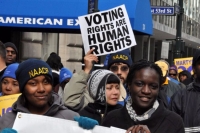Clean-up sweeps of homeless encampments destroy property, disrupt the marginal stability that informal communities bring, and do nothing to house those living outdoors. And now, in the Portland area, they are also costing taxpayers money.
Clark County, Washington, will pay a quarter-million dollars to settle a lawsuit brought by a half-dozen homeless individuals there over a series of sweeps conducted from 2012 to 2014 just north of the Oregon border.
Workers there routinely confiscated and destroyed a range of belongings during the sweeps, including camp stoves, legal documents, and family photographs. County law enforcement policy said that the work crews could only confiscate property without notice if a camp was abandoned. If it was active, residents were to be given an hour’s notice to pack their things.
But in practice, lawyers for the plaintiffs said, homeless people would routinely return to their tents from meals at local charities to find workers had purloined their stuff.
The new settlement includes $165,000 in attorneys’ fees and $85,000 in direct restitution for six people who brought the case. The county is also committing to give a full 48 hours notice before sweeps, and to offer to store property for people who get relocated — cosmetic concessions that are common in larger cities where sweeps still routinely violate homeless people’s civil rights and make it harder for people to regain their footing.
Such sweeps have grown popular with local governments around the country in recent years. They’ve also attracted negative attention in a number of communities. A public works employee in San Francisco faced official discipline after refusing to help rip down an unpermitted “tiny house” occupied by a homeless man.
Homelessness policy experts explicitly tell local officials that these policies are destructive. The U.S. Interagency Council on Homelessness noted in 2015 that “the forced dispersal of people from encampment settings…accomplishes nothing toward the goal of linking people to permanent housing opportunities, and can make it more difficult to provide such lasting solutions to people who have been sleeping and living in the encampment.”
Last year, the Department of Housing and Urban Development lent teeth to that expert advice when it updated the formula for federal funding to homelessness programs to punish cities that use a range of move-along laws to criminalize the day-to-day realities of homelessness.
Combined with a growing body of research on the net-negative human and financial impacts of criminalization policies toward the homeless, and increased buy-in on the basic idea that giving people permanent supportive housing is the best way to reduce and end homelessness, the opposition to sweeps is helping to reshape the fight against homelessness. Seattle has formally recognized temporary camps, and Indianapolis has extended legal protections to them.
But the old criminalization mentality remains widespread. Sweeps are a particularly stubborn phenomenon, and they haven’t simply disappeared. For local leaders often motivated by short-term political convenience and short-sighted public frustration, they still represent a quick “fix” to gripes from citizens and media alike.
And the real estate community often has an economic interest in seeing homeless people shuffled from one tile of a city’s chess board to another, as has been the case in East Harlem since 2014. Pope Francis was visiting a church in that long-neglected corner of Manhattan that summer, prompting NYPD officers and city workers to aggressively relocate campers on a block many had made home in the name of security.
Heavy enforcement continued there long after the Pope was headed back to the Vatican, however. There’s a new luxury high-rise apartment block going up a block away. Indigent people in the area say developers are re-branding the area around the 125th Street Amtrak and commuter rail station as “Upper Grand Central Station” to help market the neighborhood to outsiders.
Homeless people have long congregated around the station. But they don’t fit the new image. Police have continued trying to push them out of the neighborhood, prompting homelessness charities and the New York Civil Liberties Union to mount a legal challenge earlier this year.
Link to original article from ThinkProgress





 Imagine going to the polls on Election Day and discovering that your ballot could be collected and reviewed by the
Imagine going to the polls on Election Day and discovering that your ballot could be collected and reviewed by the ACLU Blueprints Offer Vision to Cut US Incarceration Rate in Half by Prioritizing 'People Over Prisons'
ACLU Blueprints Offer Vision to Cut US Incarceration Rate in Half by Prioritizing 'People Over Prisons'  "These disasters drag into the light exactly who is already being thrown away," notes Naomi Klein
"These disasters drag into the light exactly who is already being thrown away," notes Naomi Klein  How about some good news? Kansas Democratic Representative advances bill for Native Peoples.
How about some good news? Kansas Democratic Representative advances bill for Native Peoples.  What mattered was that he showed up — that he put himself in front of the people whose opinions on
What mattered was that he showed up — that he put himself in front of the people whose opinions on On a night of Democratic victories, one of the most significant wins came in Virginia, where the party held onto
On a night of Democratic victories, one of the most significant wins came in Virginia, where the party held onto A seismic political battle that could send shockwaves all the way to the White House was launched last week in
A seismic political battle that could send shockwaves all the way to the White House was launched last week in In an interview with Reuters conducted a month after he took office, Donald Trump asserted that the U.S. had “fallen
In an interview with Reuters conducted a month after he took office, Donald Trump asserted that the U.S. had “fallen Attorney General Jeff Sessions overturned the sweeping criminal charging policy of former attorney general Eric H. Holder Jr. and directed
Attorney General Jeff Sessions overturned the sweeping criminal charging policy of former attorney general Eric H. Holder Jr. and directed